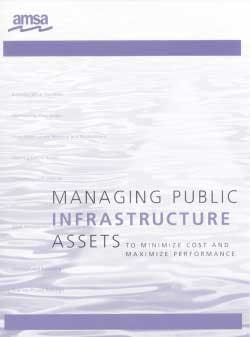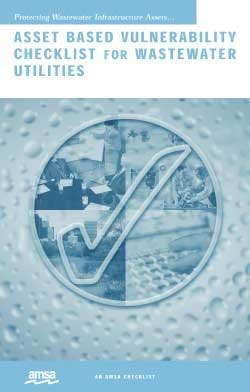Association Committed to Improving Water Quality
The Association of Metropolitan Sewerage Agencies (AMSA) is a national trade association dedicated to representing publicly owned wastewater treatment utilities in the United States. AMSA's more than 270 utility members serve the majority of the sewered population in the US and collectively treat and reclaim billions of gallons of wastewater every day.
AMSA member agency officials are environmental leaders and public servants with the daily responsibility of protecting and improving the nation's public health and the quality of thenation's rivers, lakes streams and harbors.
The association's mission is to bring the voice of the nation's wastewater community to Congress and EPA with the goal of helping to develop environmentally friendly, scientifically sound, and cost-effective policies affecting the wastewater treatment community. AMSA's issues run the gamut of water quality policy, garnering legislative support for infrastructure funding, security initiatives and environmentally sound biosolids practices.
Practical, environmentally beneficial regulations are also a core concern of AMSA and its members. Recent regulations of interest include wet weather programs, total maximum daily load rules and the mercury policy, among others. Additionally, AMSA's General Counsel works for solid legal outcomes and provides a host of services to its membership, keeping the wastewater community up to date on legal precedent and trends pertaining to water quality.
AMSA also provides members with up-to-date information and tools to help improve their efforts to be competitively and efficiently managed and run their utilities. The association's active committee structure ensures that those who know most about water quality issues - local wastewater treatment agency leaders - provide the voice to help shape national clean water policy.
Water Quality Priorities, Municipal Challenges
This year marks the 30th anniversary of the Clean Water Act (CWA) - a legislative landmark commitment to national water quality. This anniversary offers federal, state and local policymakers a fundamental choice - continue building on the 30 years of progress AMSA's members have helped achieve, or risk a regression of national water quality.
AMSA believes that clean water progress starts with a federal commitment to the nation's municipalities. Municipalities face a tremendous water and wastewater infrastructure funding shortfall, increasing Clean Water Act compliance costs, and tightening budgets. In the wake of the tragedies of Sept. 11, 2001, municipalities also face daunting expenses to secure their water and wastewater systems. While these and other challenges constitute a major test to the continued progress of the nation's water quality, AMSA has developed plans, publications, tools, conferences and other initiatives to help the wastewater treatment community meet these challenges.
Infrastructure Funding
AMSA's top legislative priority is to make Congress and the nation aware of a massive funding shortfall for wastewater infrastructure. Municipalities currently fund 90% of all water infrastructure projects. Without long-term, federal grant funding, municipalities will be unable to continue to repair and replace the nation's aging and ailing wastewater infrastructure.
To ensure the national recognition the infrastructure issue merits, AMSA is a founding member of the Water Infrastructure Network (WIN) - a broad coalition dedicated to preserving the water quality gains made possible by water and wastewater infrastructure. WIN's April 2001 Water Infrastructure Now report estimates a $23 billion annual water/wastewater funding shortfall over the next 20 years, with wastewater infrastructure needs comprising $12 billion of the annual total.
AMSA's leadership on this issue has helped make this a top environmental priority for EPA, Congress and the nation. This spring, the U.S. House of Representatives and the Senate both introduced infrastructure funding legislation. While this legislation marks an important first step by Congress toward increasing federal involvement in wastewater infrastructure funding, more must be done. AMSA will continue to work with Congress on infrastructure funding legislation. For more information on the WIN effort, visit www.win-water.org.
Infrastructure Security
Since the tragedies of September 11, AMSA has responded to the security needs of the wastewater treatment community by developing tools necessary to secure wastewater treatment plant assets and uninterrupted service to customers. The association issued two publications that have become industry standards in the security arena - the Asset Based Vulnerability Checklist for Wastewater Utilities and the Legal Issues in a Time of Crisis Checklist. These companion Checklists are designed to help utilities as they assess, prioritize and ultimately remediate their security vulnerabilities, while also considering the complex legal issues that accompany security assessments and upgrades. These publications are available on AMSA's website at https://www.bizinfonet.com/amsa-cleanwater.org/neworder.htm.
AMSA and EPA are also working together on the Vulnerability Self Assessment Tool (VSAT) - a software program that will help wastewater utilities assess their vulnerabilities to security and crisis situations. VSAT will also help wastewater treatment agencies develop plans to protect their assets, including their customers, employees, treatment plants, information technology and other asset categories.
VSAT will be available to the wastewater community in June 2002. For more on VSAT, visit AMSA's website at www.amsa-cleanwater.org and click on the security icon.
Utility Competitiveness
While it is AMSA's position that the federal government must participate more in helping municipalities improve the nation's water quality, its members recognize that wastewater treatment utilities must continually improve their competitiveness and efficiency.
To meet these needs, AMSA has developed a suite of tools. One such tool is its triennial Financial Survey, due out in June 2002. This survey addresses a variety of questions regarding budgetary challenges that continue to impact the financial resources required to control water pollution, such as user charges, operation and maintenance costs, outstanding debt service levels, and employee salary comparisons. The 2002 Survey also contains information on asset management, security financing needs and utility staffing levels.
Additionally, AMSA's recently released its Managing Public Infrastructure Assets publication, which provides an in-depth primer on asset management principles, navigates impending financial reporting regulations and assists public water and wastewater utilities in developing local asset management programs. Major changes to financial accounting and reporting standards by the Governmental Accounting Standards Board (better known as GASB 34), requiring local governments to report depreciation of their assets or implement an asset management system beginning with the 2002 fiscal year, make the publication a timely resource.
For more information on these asset management and competitiveness tools visit http://www.amsa-cleanwater.org/ pubs/.
Regulatory Priorities
AMSA also plays a central role in the development of environmentally sound rules in a number of key arenas, including wet weather, total maximum daily loads and nonpoint source controls, national mercury policy, and a host of other significant issues.
Wet Weather
Perhaps the most important regulatory concern of AMSA and its members is federal wet weather policy, including sanitary sewer overflow (SSO) and combined sewer overflow (CSO) regulations. AMSA believes that EPA and the Association must continue to work closely to ensure a viable and environmentally sound policy to limit CSOs and SSOs. According to EPA's own estimates, long-term wet weather control projects would cost municipalities upwards of $45 billion. A solution to the environmental and fiscal challenges that CSOs and SSOs pose must involve a federal-state-municipal partnership to succeed.
AMSA has long maintained that a federal rule prohibiting overflows (or a "zero overflow" policy) is simply impossible from an engineering and financial standpoint. Federal policy to reduce CSOs and SSOs must be flexible and allow treatment works to develop capacity, management operation and maintenance (CMOM) programs that have already and will continue to reduce wet weather overflows.
AMSA's recent publication of Com-munities at Work - the National Response to Combined Sewer Overflows (AMSA's CSO Report to Congress) shows that municipalities have already decreased CSOs by nearly 50 percent and have made unprecedented investments in improving these systems. AMSA is proud of the progress its members have made in reducing CSOs and SSOs and looks forward to working with EPA to develop a real-world SSO policy that takes the expertise and practical considerations of public treatment works into full account. AMSA's CSO Report is available online at http://www.amsa-cleanwater.org/advocacy/01-31-02csoreport.pdf.
TMDLs, Mercury, and More
AMSA's other regulatory priorities are focused on protecting the health of the nation's waters. AMSA believes strongly that any viable total maximum daily load (TMDL) policy - which sets limits on the amount of pollutants discharged into waterways - must include nonpoint sources such as agricultural interests. Nonpoint sources account for the large majority of water pollution, yet they remain outside the regulated community. AMSA strongly believes that continued progress under the Clean Water Act depends upon the inclusion of nonpoint sources in any meaningful regulatory scheme.
Download AMSA's TMDL White Paper at http://www.amsa-cleanwater.org/advocacy/7-18-01tmdlwhitepaper.pdf to learn more about AMSA's position on this key water quality issue.
AMSA also favors a national mercury strategy to ensure that waterways cease to be polluted by mercury. AMSA supports congressional efforts to set up a national mercury program that will help stop mercury pollution at its industrial and domestic sources.
For additional information on AMSA and its initiatives, please call AMSA's National Office at 202/833-AMSA or visit the Clean Water on the Web site at http://www.amsa-cleanwater.org.



